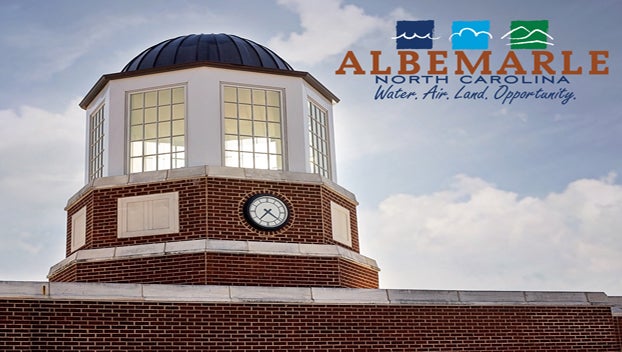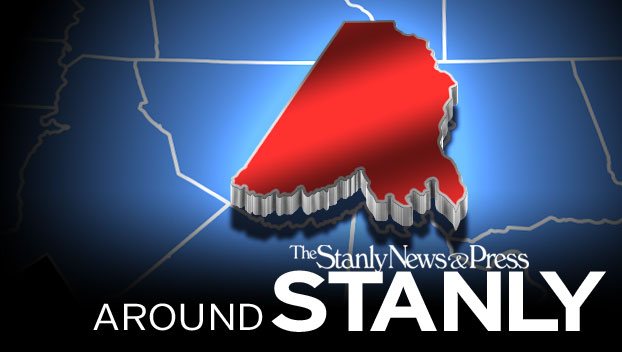Citizens voice concerns on Albemarle stormwater management plan
Published 8:51 am Wednesday, January 4, 2023
|
Getting your Trinity Audio player ready...
|
A public hearing regarding the city’s proposed implementation of a stormwater management plan drew around 35 residents to Albemarle City Hall on Tuesday evening, 14 of whom expressed concerns with elements of the project.
Primary issues of concern included the necessity of the plan, costs of implementing the plan and the timeline for completion and implementation.
Mayor Ronnie Michael opened the hearing by reminding those present of the meeting’s purpose.
“This is a public hearing,” Michael said. “We will only be listening to your comments. No decision will be made tonight.”
Unable to attend in person because of sickness, Albemarle Public Works Director Ross Holshouser gave a remote presentation of the project proposal, using PowerPoint slides to outline and illustrate its purpose, scope and cost.
In addition to addressing the failure of aging infrastructure and encouraging economic development, Holshouser identified meeting state regulatory requirements in a proactive manner as a major need to move ahead with the project.
“We need to take care of some of these issues now, before the state steps in,” he said.
The proposed stormwater program, if approved by Council, would cost about $1.06 million, with funding coming primarily through stormwater fees assessed to city residents and businesses.
The proposed residential fee, based on an average of 3,270 square feet (one “ERU” or “equivalent residential unit”) of impervious surface per residence, would be $5.80 per month. For non-residential customers, costs would be determined based on the actual square footage of impervious surface on their properties, divided by 3,270, yielding the total ERU’s for the tract. That number would then be multiplied by $5.80 to determine the monthly stormwater fee for that property.
While most who spoke acknowledged the need for a stormwater plan, some questioned its necessity.
Jim Lowder of A.L. Lowder, Inc. spoke first, and was critical of Holshouser’s remote presentation.
“I didn’t get a thing out of it,” he said, describing the plan as “a secret.”
“If this thing ever goes through and the people are satisfied with it, you’re going to have to put some people, some real people, not somebody up there like this, where they can be seen, heard and believed,” he added.
Lowder went on to state that he had personally rectified a number of drainage issues on his own properties.
“I spent 10 years of my own time and money to prevent stormwater flooding, and I was successful in that venture, but I got no help from the city, no guidance or anything, and what I done worked, no thanks to any engineer,” Lowder said. “I don’t see how you hope to push this program across to anybody.”
Ronnie Stiller of Ellenwood Court and Paul McKay of Elmwood Avenue expressed concerns over inadequate stormwater drainage design in their neighborhoods, resulting in flooding on their properties.
“I live on a dead-end street. We have no curb and gutter, no storm drains, nothing,” said Stiller, “and all the water from the street comes down and floods out my lower drive, and I don’t think I should be responsible to pay for somebody else’s problem.”
McKay expressed similar concerns, noting that the culvert under his driveway is “too small,” and that runoff from surrounding properties creates flooding around his home.
“My property is a stormwater collection pond,” said McKay.
Edgewood Drive resident Donald Lowman stated why he is opposed to paying stormwater fees.
“My house doesn’t drain into a creek or stream,” he said, “it just drains into my back yard,” he said.
The timing of implementing the project was questioned by George Carpenter of Badin Road and Burl Maner of Russell Road.
“With all the inflation we are seeing now, I believe this is the wrong time to undertake such a project,” said Carpenter, who also opined that the high cost of stormwater fees for large retailers such as Walmart would be passed on to the consumer.
“We will pay for it (in cost increases),” he added.
Maner, who owns 30 acres on Russell Road, agreed in regard to the project’s timing, stating, “it needs to be done, but not all at once.”
Northbrook Drive resident Duke Furr observed that much of the city’s current issues with stormwater are the result of questionable practices by builders in the early 1900s.
“The city piped a lot of creeks that they shouldn’t have,” said Furr, noting that many homes and businesses in the area of Central Elementary School, including the school’s athletic field, are built atop creeks that were piped in the 1920s and 1930s.
“The city did this back then,” said Furr, adding that some houses in the area had basement drains that flowed directly into the piped creeks beneath.
Mitchell Cook expressed concerns about the hardship the additional monthly stormwater fee would create for those on a fixed income.
“We need to consider our senior citizens,” said Cook, noting that the additional monthly charge could create a problem for them.
Ritchie Hearne, a registered North Carolina engineer, addressed “sticker shock” on fees, amounts paid to consultants and stormwater problem areas in his comments.
“I’m not sure people understand how ERUs are being applied in determining their monthly stormwater fee for non-residential properties,” said Hearne, expressing concern for those who operate shopping centers, old mills, etc.
“These fees will hammer them,” said Hearne.
Hearne also questioned the cost of implementing the program and amounts paid to contractors.
“How much bang has the city got for their buck so far?” he asked, noting that $600,000 in city expenditures so far have been paid from the general fund, and appropriated to a study on the Melchor Branch area, which has since been put on hold.
“Is that the best place to have spent that money?” Hearne questioned, before expressing that he believes the Long Creek and Little Long Creek areas are more important.
“Our biggest problem areas are Long Creek and Little Long Creek,” he said. “That’s where the water is going; start there and work your way up.”
Pointing out that the proposed project budget of $1.06 million breaks down to 20 percent capital projects and 80 percent personnel and other expenses, Hearne expressed concern that “that’s not really putting any action on the ground.”
“Is that a good percentage to have?” he asked.
Billy Mills of Brenda Drive expressed concern over utilization of new personnel as well as maintenance of existing stormwater drains.
“Will these new personnel be used in other areas when not involved with stormwater issues?” he asked, to which Michael replied that all departments share personnel when necessary.
Observing that poor maintenance has caused some stormwater issues, Mills cited a personal experience in which his daughter and his two grandchildren were traveling by auto and had been swept off N.C. Highway 73 near the City Lake bridge during a recent heavy rain event which had caused a storm drain to back up. Only by the action of two “good Samaritans” were the three rescued, he said.
“Lack of maintenance is a cause of lots of our stormwater problems,” said Mills.
Carla Lowder, citing flooding in the City Lake Drive area — some of which is outside the city limits, stated that better cooperation between governmental entities is needed.
“We need better collaboration between the city and the county,” she said.
Lowder also suggested that development in the city be delayed until all piping in the city is mapped. Lowder also expressed concern over how often stormwater rates would be increased if the plan is adopted.
Earlier in the meeting, Donald Lowman suggested making the final decision on the plan one for all city residents.
“Put it on the ballot, and let people vote yes or no,” he said.
Council adjourned until its regularly scheduled meeting on Monday.






